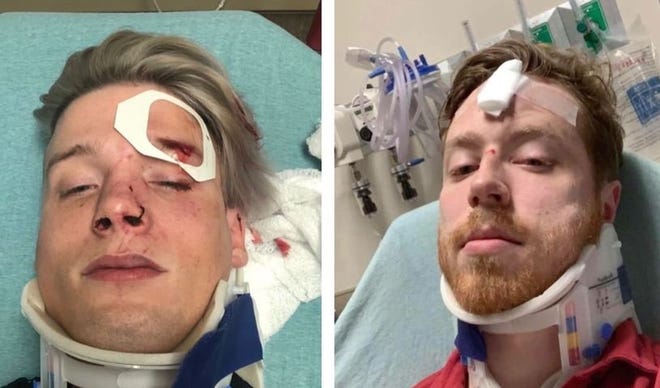In an assault case that galvanized support for the victims by the city’s LGBTQ community, three of the four men accused in the crime have taken plea deals, admitting that they beat a gay couple in downtown Austin in 2019, and the fourth man’s case was dismissed.
The three men each pleaded to two counts of misdemeanor assault with a hate crime finding, even though the Austin police detective who investigated the fight reported about a year into the investigation that he did not believe the assault was a hate crime. The attorney representing the man whose charge was dismissed said the case was “motivated by misinformation.”
The assault against Spencer Deehring and Tristan Perry inspired a nighttime rally at the Capitol and the creation of a citizen foot patrol, but it also drew new attention to the prosecution of hate crimes in Austin.
“We will not stop until the hate crime laws in Texas are enhanced to allow thorough prosecution of those committing such heinous crimes,” Perry and Deehring said in a statement. “Our community has to live in constant fear of narrow-minded violent individuals that are threatened by our very existence. No person should be subjected to violence because of who they love or what they look like. Love will always conquer hate.”
Quinn O’Connor, Frank Macias and Kolby Monell will not serve any additional jail time as part of the plea deal. O’Connor and Monell will serve two years of probation, 50 hours of community service each, anger management counseling, and they must stay away from downtown for two years.
Macias agreed to one year of jail time, but was already credited for the time he served in Travis County and is now in the Denton County Jail on a different charge.
The case against Miguel Macias was dismissed.
Previously:Man accused of assaulting gay couple in downtown Austin arrested after missing court date
“I have been, and will continue to be, outspoken that this case was overcharged and motivated by misinformation,” Brian Erskine, Miguel Macias’ attorney, said in a statement Tuesday. “Law enforcement enraged our community with a ruse of bigotry. And, while it is morally easy and legally just for them to ‘protect’ our LGBTQ community, it is much more difficult to confront the fact that Perry and Deehring also used racial slurs to instigate and aggravate the situation into a mutual fight that didn’t end in their favor.”
Months into the investigation, Austin police Detective Robert Field spoke with a prosecutor and said he believed the fight started when one of the men in the group of four bumped shoulders with one of the gay men while they were passing on the street. Field also told prosecutors that one of the four men, Frank Macias, mentioned in an interview with investigators that one of the gay men had made a racial comment to Macias’ group.
Perry told police he was punched to the ground, where he was beaten with fists and feet. According to the affidavit, Deehring intervened and also was knocked to the ground and beaten.
Medics took the couple to the hospital, where they were treated for numerous injuries, including concussions.
“The district attorney’s office takes these cases very seriously,” Assistant District Attorney Beth Payan said in a statement. “We worked very hard to evaluate this case and proceed appropriately based on the facts and evidence after consulting with the victims. It was very important to us that we secure the hate crime finding so that justice could finally be served. Hate crimes will not be tolerated here in Travis County, and they will be prosecuted accordingly.”
Texas law regarding hate crimes states that investigators “have to prove that the defendants selected the victims because of their bias,” said Rhett Braniff, Frank Macias’ attorney. “What most of us felt, in this case, was that if a jury looked at the evidence here, they may not have come to that conclusion. In other words, this was a fight between two groups of people, and it may have happened regardless of the sexual orientation of either of them.”
The four men were initially charged with aggravated assault with a deadly weapon, a first-degree felony. The hate crime designation would have allowed the crime’s maximum penalty to be life in prison.
Prosecutors “bent the deadly weapon statute to suggest hands are deadly, which is the only reason these cases remained a felony and not a misdemeanor,” Erskine said.
Defense attorney Leslie Boykin, who represented O’Connor, declined to speculate on whether it was a hate crime.
The hate crime finding “was very important to the victims, so I don’t believe that we would have been able to get to a misdemeanor had they not agreed to that,” Boykin said.
Rick Flores, Monell’s attorney, said he appreciated the DA’s office giving his client the opportunity to plead to a misdemeanor.
“I only wish they had gone further and recognized this for what it was — a downtown fight rather than a hate crime,” Flores said.
Erskine said he doesn’t blame the other men for their pleas deals.
“I know the risk of life imprisonment is far too great,” Erskine said. “For Miguel, dismissal was the only appropriate resolution because the evidence showed he was not hateful and was not violent.”








